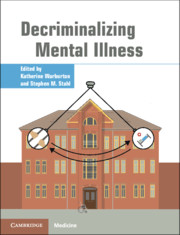Book contents
- Decriminalizing Mental Illness
- Decriminalizing Mental Illness
- Copyright page
- Contents
- Contributors
- Part I Introduction/Description of the Problem
- Part II Solutions
- Part III Psychopharmacological Treatment Considerations
- Part IV Nonpsychopharmacological Treatment Considerations
- Part V Criminal Justice and Social Considerations
- Chapter 28 Tipping the Scales Of Justice: The Role of Forensic Evaluations in the Criminalization of Mental Illness
- Chapter 29 Competence to Stand Trial and Criminalization: An Overview of the Research
- Chapter 30 Risk Factors for Recidivism in Individuals Receiving Community Sentences: A Systematic Review and Meta-Analysis
- Chapter 31 Developing Policies for Adult Sexual Minorities with Mental Health Needs in Secured Settings
- Chapter 32 An Overview of Jail-Based Competency Restoration
- Chapter 33 Fixated Threat Assessment Centres: Preventing Harm and Facilitating Care in Public Figure Threat Cases and Those Thought to Be at Risk of Lone-Actor Grievance-Fuelled Violence
- Chapter 34 Decriminalizing LGBTQ+: Reproducing and Resisting Mental Health Inequities
- Chapter 35 Building a Therapeutic Relationship Between Probation Officers and Probationers with Serious Mental Illnesses
- Chapter 36 Length of Stay for Inpatient Incompetent to Stand Trial (IST) Patients: Importance of Clinical and Demographic Variables
- Chapter 37 Severe Mentally Ill Patients: Our Global Migrants
- Index
- References
Chapter 31 - Developing Policies for Adult Sexual Minorities with Mental Health Needs in Secured Settings
from Part V - Criminal Justice and Social Considerations
Published online by Cambridge University Press: 19 October 2021
- Decriminalizing Mental Illness
- Decriminalizing Mental Illness
- Copyright page
- Contents
- Contributors
- Part I Introduction/Description of the Problem
- Part II Solutions
- Part III Psychopharmacological Treatment Considerations
- Part IV Nonpsychopharmacological Treatment Considerations
- Part V Criminal Justice and Social Considerations
- Chapter 28 Tipping the Scales Of Justice: The Role of Forensic Evaluations in the Criminalization of Mental Illness
- Chapter 29 Competence to Stand Trial and Criminalization: An Overview of the Research
- Chapter 30 Risk Factors for Recidivism in Individuals Receiving Community Sentences: A Systematic Review and Meta-Analysis
- Chapter 31 Developing Policies for Adult Sexual Minorities with Mental Health Needs in Secured Settings
- Chapter 32 An Overview of Jail-Based Competency Restoration
- Chapter 33 Fixated Threat Assessment Centres: Preventing Harm and Facilitating Care in Public Figure Threat Cases and Those Thought to Be at Risk of Lone-Actor Grievance-Fuelled Violence
- Chapter 34 Decriminalizing LGBTQ+: Reproducing and Resisting Mental Health Inequities
- Chapter 35 Building a Therapeutic Relationship Between Probation Officers and Probationers with Serious Mental Illnesses
- Chapter 36 Length of Stay for Inpatient Incompetent to Stand Trial (IST) Patients: Importance of Clinical and Demographic Variables
- Chapter 37 Severe Mentally Ill Patients: Our Global Migrants
- Index
- References
Summary
Lesbian, Gay, Bisexual, and Transgender (LGBT) people, are more likely to be disproportionally placed in a secured setting. Secured settings such jails, prisons, and forensic hospitals can be traumatizing, hostile, and dangerous – especially for those who are transgender, which is only compounded when responsive and appropriate policies, procedures and training are not in place to maintain safety, privacy, and dignity. All LGBT residents, and more importantly those suffering from mental illness, who are in secured environments should be free of discrimination, victimization, and abuse. They should have equal access to safe housing, vocational programs, rehabilitation services, as well as medical and mental health treatments. Many organizations such as National Center for Transgender Equality, National Institute of Corrections (NIC), the World Professional Association for Transgender Health (WPATH) and The Joint Commission (TJC) provide guidelines to ensure that LGBT residents are protected.
- Type
- Chapter
- Information
- Decriminalizing Mental Illness , pp. 315 - 320Publisher: Cambridge University PressPrint publication year: 2021

